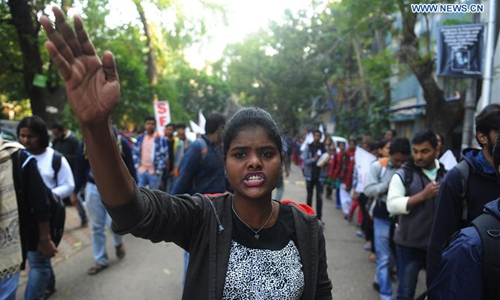HOME >> WORLD
Indians strike over labor policies
Source:AFP Published: 2020/1/8 21:08:40
Travel chaos across country as millions protest

Students take part in a protest against the violence that erupted inside the Delhi-based Jawaharlal Nehru University (JNU) in Kolkata, India, on Jan. 6, 2020. University and college students staged protests and demonstrations across many cities in India, including Kolkata, Mumbai, Delhi and Aligarh, against the violence that erupted inside the Jawaharlal Nehru University injuring around 30 students. Photo:Xinhua
Millions went on strike throughout India on Wednesday, unions said, as workers angry at the government's labor policies brought travel chaos across the country.The widespread action was in opposition to what unions called the "anti-worker and anti-people policies" of right-wing Prime Minister Narendra Modi.
They highlighted the recent privatization of public firms and natural resources and demanded a rise in the minimum wage and pensions.
Farmers and students joined some of the protests called by 10 trade unions who claim 250 million members between them.
Bus and train services and state-owned banks bore the brunt of the national strike action that was staged in defiance of government warnings of "consequences" for anyone who took part.
Protesters blocked roads and railway tracks, while those at rallies also chanted slogans against the government's new nationality law that opponents say is anti-Muslim and has sparked widespread demonstrations.
In West Bengal state, strikers targeted railways and key highways and burned tires on a main road in state capital Kolkata. Protesters carried red flags at rallies in the city.
Police said there had been some "clashes" in Kolkata and other districts between supporters and opponents of the strike.
The eastern states of Bihar and Odisha, Maharashtra in the west, Haryana in the north, and Kerala and Karnataka in the south were also hit by the action.
Some workers at state oil and coal firms joined the strike.
The government had warned strikers that they would face "consequences" including having wages deducted and other disciplinary action if they joined the protest.
But the strike added to pressure on the Modi government already hit by widespread protests over the nationality law passed on December 11. More than 25 people have been killed in the protests.
Growing unrest in universities has added to social tensions.
"The attitude of the government is that of contempt towards labor," said the Center of Indian Trade Unions, one of the groups organizing Wednesday's 24-hour strike.
Opposition parties have backed the strikers. Rahul Gandhi, former leader of the main opposition Congress party, said the government had "created catastrophic unemployment" in a Twitter message praising the action.
Posted in: ASIA-PACIFIC